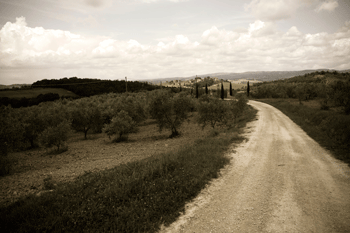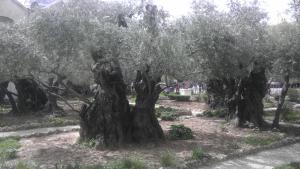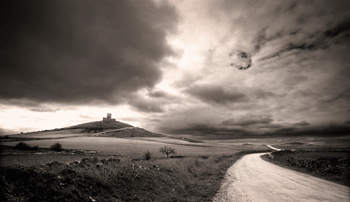 Jesus,
Jesus,  easter,
easter,  hosanna,
hosanna,  messiah,
messiah,  mount of olives,
mount of olives,  palm sunday,
palm sunday,  passion week,
passion week,  son of david,
son of david,  triumphal entry in
triumphal entry in  Bible,
Bible,  Devotional,
Devotional,  Easter,
Easter,  Jesus,
Jesus,  Kingdom of God,
Kingdom of God,  Passion Week,
Passion Week,  Scripture,
Scripture,  Suffering,
Suffering,  Teaching
Teaching
|
|
 Sunday, April 1, 2012 at 7:46PM
Sunday, April 1, 2012 at 7:46PM  Less than three weeks ago, I walked through Jerusalem, going through most of the historic locations where Jesus is recorded to have traveled in his Passion week. Beginning with the Mount of Olives, I walked down the road leading to the Old City area, the likely route many scholars believe Jesus might have taken for his triumphal entry. As you walk down the road into the Kidron Valley you can see the enormity of the temple mount, on which used to sit the huge edifice of Judaism- the temple itself. With the people clamoring and honoring Jesus by placing the palm branches in his path, one can imagine the heady jubilation that was in the air. The crowds were lauding him as he was welcomed as the "Son of David", "He who comes in the name of the Lord", "Peace in heaven and glory in the highest!" and "the king of Israel".
Less than three weeks ago, I walked through Jerusalem, going through most of the historic locations where Jesus is recorded to have traveled in his Passion week. Beginning with the Mount of Olives, I walked down the road leading to the Old City area, the likely route many scholars believe Jesus might have taken for his triumphal entry. As you walk down the road into the Kidron Valley you can see the enormity of the temple mount, on which used to sit the huge edifice of Judaism- the temple itself. With the people clamoring and honoring Jesus by placing the palm branches in his path, one can imagine the heady jubilation that was in the air. The crowds were lauding him as he was welcomed as the "Son of David", "He who comes in the name of the Lord", "Peace in heaven and glory in the highest!" and "the king of Israel".
One must understand the times of 1st century Palestine. One must understand that the Jews were subject to the occupation of the Roman "super power" that kept the Jewish hopes under the heel of the Roman legions. One must understand that inside this imperial stranglehold was the hidden and overt unrest that was regularly seething up, being headed by so-called "messiahs" who would rise up to lead revolts only to eventually be crushed on the power of the ruling regime. But the Jewish people still had hope- hope that a Messiah would come and free them from their oppression, just as YHWH had come in their history and freed them from oppression. Surely the new Messiah would do the same- free them from the oppression of military and political domination.
 Modern Day Olive Groves in the area of the Garden of GethsemaneThe road would have taken Jesus by the Garden of Gethsemane, which he would later return to in his most painful hour. But he could continue for now. As Jesus descended the hill, on his road down to Jerusalem, one gets the sense that the Messiah the Jews were hoping for was something quite different than the king who was riding on the donkey, quite different from Jesus. Certainly Jesus had become known and his miraculous deeds had drawn the attention of many people, small and great. But the crowds were drawn to Jesus even more as he refuted and confounded the religious leaders, always showing compassion to the outcast, the rejected and lowly. But as they saw Jesus coming now, entering the city, they glorified the Jesus they hoped for, not the one who was truly there. They wanted a Jesus who would lead them as a political and perhaps military leader, freeing them from the oppression of Rome. But many other military revolutionaries had come and gone- and Rome eventually crushed them all.
Modern Day Olive Groves in the area of the Garden of GethsemaneThe road would have taken Jesus by the Garden of Gethsemane, which he would later return to in his most painful hour. But he could continue for now. As Jesus descended the hill, on his road down to Jerusalem, one gets the sense that the Messiah the Jews were hoping for was something quite different than the king who was riding on the donkey, quite different from Jesus. Certainly Jesus had become known and his miraculous deeds had drawn the attention of many people, small and great. But the crowds were drawn to Jesus even more as he refuted and confounded the religious leaders, always showing compassion to the outcast, the rejected and lowly. But as they saw Jesus coming now, entering the city, they glorified the Jesus they hoped for, not the one who was truly there. They wanted a Jesus who would lead them as a political and perhaps military leader, freeing them from the oppression of Rome. But many other military revolutionaries had come and gone- and Rome eventually crushed them all.
No, the Jesus that rode the donkey into Jerusalem was coming in peace. He had, in himself, the hope for true peace, where every person could rest their soul. They wanted a Jesus who could come and destroy the enemy- the real Jesus was there to die. They wanted a victorious Jesus- the real Jesus was there to surrender to seeming defeat. They wanted a Jesus who would defend and expel the rulers and authorities and establish justice against them- the real Jesus would not even open his mouth to defend himself, and allowed the cruel injustice and hatred of all evil to be placed on his head as a thorny crown of pain.
The road Jesus was taking could have looked like one of victory. The jubilant shouts from the crowd could rally any political or popular leader. But Jesus neither rebuked the crowds (as the Pharisees asked him to do), nor did he give their adulation a confirmation of its hidden meaning. With this backdrop, let us read again, the account of Luke's gospel and Jesus entry to Jerusalem.
They brought it to Jesus, threw their cloaks on the colt and put Jesus on it. As he went along, people spread their cloaks on the road. When he came near the place where the road goes down the Mount of Olives, the whole crowd of disciples began joyfully to praise God in loud voices for all the miracles they had seen:
"Blessed is the king who comes in the name of the Lord!""Peace in heaven and glory in the highest!"
Some of the Pharisees in the crowd said to Jesus, "Teacher, rebuke your disciples!""I tell you," he replied, "if they keep quiet, the stones will cry out."
As he approached Jerusalem and saw the city, he wept over it and said, "If you, even you, had only known on this day what would bring you peace—but now it is hidden from your eyes. The days will come upon you when your enemies will build an embankment against you and encircle you and hem you in on every side. They will dash you to the ground, you and the children within your walls. They will not leave one stone on another, because you did not recognize the time of God’s coming to you."
(Luke 19:35-44)
Notice, how Jesus responds to the real issues here. Yes, he had come to bring peace, but not the peace the nation and people of Israel hoped for. They hoped for a revolution that would free them from political oppression. Jesus wouldn't bring leadership to such a revolution. And in fact, the peace Jesus had in mind would be rejected. The crowds would watch Jesus die and then move on to look for another revolutionary that they would follow in rebellion against Rome. Jesus was warning them here that such a leader and revolution would not bring them peace, but would eventually lead to their utter destruction. And in 70AD, this prophetic word of Jesus came to fruition, as the Roman general Titus would lay siege to Jerusalem. Titus (who would later become emperor) came to put down a revolt that had temporarily placed control of Jerusalem back in the hands of revolutionary Jews in the year 66AD. To show Roman imperial power, Titus would utterly wipe Jerusalem, the temple and its people into dust, demolishing everything but the temple mount foundation on which the temple stood.
Jesus knew political and military revolt was not the answer to the problems of the Jews, or humanity. The real revolution would indeed be about peace, but not a peace brought by power- a peace brought by surrender to the will of God. Jesus wouldn't explain it- it seemed that even his own disciples didn't understand. Jesus would have to show them what peace looked like. Jesus' peace did not mean "calm". Instead, it meant looking into the face of violence and accusation and remaining resolute to love. Jesus' peace didn't mean the absence of pain. Instead it meant enduring the worst pain, and not giving in to retribution or response in kind.
 So while the people didn't recognize what kind of peace Jesus was bringing, He brought them the real peace they couldn't have understood. And on this triumphal entry, he didn't try to make everyone understand. He didn't stop the parade and correct everyone. He didn't make sure those following him were "tracking with the plan". No. Jesus simply trusted that being who he was, and facing what he would face, he would incarnate in his own flesh the perfect example of peace that would speak louder than words could say. He knew his words would fall on deaf ears (remember he said "If you, even you, had only known on this day what would bring you peace—but now it is hidden from your eyes"). So Jesus just continued on the road. The road of misunderstanding. The road of jubilation. The road of joy. The road of peace. The road triumphal entry. The road of obedience. The road of pain.
So while the people didn't recognize what kind of peace Jesus was bringing, He brought them the real peace they couldn't have understood. And on this triumphal entry, he didn't try to make everyone understand. He didn't stop the parade and correct everyone. He didn't make sure those following him were "tracking with the plan". No. Jesus simply trusted that being who he was, and facing what he would face, he would incarnate in his own flesh the perfect example of peace that would speak louder than words could say. He knew his words would fall on deaf ears (remember he said "If you, even you, had only known on this day what would bring you peace—but now it is hidden from your eyes"). So Jesus just continued on the road. The road of misunderstanding. The road of jubilation. The road of joy. The road of peace. The road triumphal entry. The road of obedience. The road of pain.
As you take stock of your own life, what road are you on? More importantly, as you go, are you following on the road Jesus is leading you through? Are you frustrated with not being understood? Are you upset that things aren't "calm"? Perhaps it is time for us to accept that the peace God brings is not that of being understood. The peace God brings is instead about following our call such that the ravages of the outside world (whether they are chanting for us, or against us) do not change the direction of our lives. The peace that God brings is the keel of our ship- it doesn't change course, but it gives us a centering strength bound in God's love. The peace that God brings walks through the valley of the shadow of death and fears no evil- not because it won't come upon us, but because it won't do real harm to God's purposes even when it touches us.
Come, Lord Jesus. Bring us with you on your road of peace. Help us hear your voice, not that of the crowds. Help us follow your heart, not the surging passions of defending ourselves against others, or of obtaining "what we deserve". Help us follow you on the road, Lord Jesus. The road of your pain. The road of your peace.
Travelling with you,
Kim Gentes
 Jesus,
Jesus,  easter,
easter,  hosanna,
hosanna,  messiah,
messiah,  mount of olives,
mount of olives,  palm sunday,
palm sunday,  passion week,
passion week,  son of david,
son of david,  triumphal entry in
triumphal entry in  Bible,
Bible,  Devotional,
Devotional,  Easter,
Easter,  Jesus,
Jesus,  Kingdom of God,
Kingdom of God,  Passion Week,
Passion Week,  Scripture,
Scripture,  Suffering,
Suffering,  Teaching
Teaching